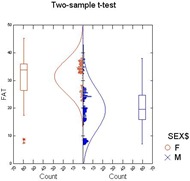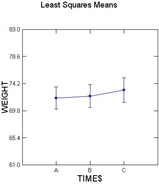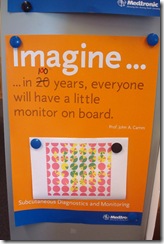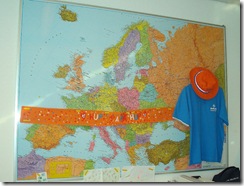 I received a study data set from a colleague yesterday that measures the weight and body fat percentage of a dozen normal people, three times a day, over the course of a month. He asked if I could help with calculating the statistics, and I spent the morning organizing and importing the data, then doing some simple exploratory analysis to get a sense of what was in there. After preprocessing to adjust the shapes of the distributions of raw data and to do a quality check on outliers, I like to pose questions and see if the answers match my intuition.
I received a study data set from a colleague yesterday that measures the weight and body fat percentage of a dozen normal people, three times a day, over the course of a month. He asked if I could help with calculating the statistics, and I spent the morning organizing and importing the data, then doing some simple exploratory analysis to get a sense of what was in there. After preprocessing to adjust the shapes of the distributions of raw data and to do a quality check on outliers, I like to pose questions and see if the answers match my intuition.
 Do women have a higher body fat percentage than men? They should, and, from the data (above), they do.
Do women have a higher body fat percentage than men? They should, and, from the data (above), they do.
Does weight change from morning (A) to noon (B) to night (C)? I expect it to increase, and it does (but not significantly). Interestingly, most of this seems to be water weight gain: the percentage of fat drops, the percentage of liquid goes up.
To try to get a better understanding, I calculate Body Mass index (BMI) for each case: weight (in kg) divided by height, squared (in meters). For fun, I calculate my own BMI: 5'10", 172 lbs: BMI 24.7. Comparing with the WHO charts gives a range for normal as 18.50 to 25, pre-obese from 25 to 30, obese above 30.
"Borderline pre-obese?
Granted, I'm not Dutch-thin, but I am not overweight by any means. I exercise, watch what I eat, stay close to the weight I had in grad school. (I rationalize that muscle is dense, so at least a little weight should be what I build up at the health club? 'hope so...)
 The whole notion of 'pre-obese' is, in itself, troublesome to me. Medical researchers have data to show that that people who develop disorders like hypertension, diabetes, and obesity actually start to trend that way years before the pathology develops. As a result, they have started to label an early, mild increase in blood pressure, glucose, and weight as 'pre-xxx syndrome'. The pharmaceutical companies have been delighted to expand their patient base for therapeutic medications to include this group, and to support studies that result in more stringent recommendations in the Guidelines.
The whole notion of 'pre-obese' is, in itself, troublesome to me. Medical researchers have data to show that that people who develop disorders like hypertension, diabetes, and obesity actually start to trend that way years before the pathology develops. As a result, they have started to label an early, mild increase in blood pressure, glucose, and weight as 'pre-xxx syndrome'. The pharmaceutical companies have been delighted to expand their patient base for therapeutic medications to include this group, and to support studies that result in more stringent recommendations in the Guidelines.
For me, a single data point is not a trend, and a BMI of 24.7 is not 'borderline pre-obese'. Two points suggest a trend, and three are needed to define the acceleration. Then it would be clear whether someone is trending into obesity (or hypertension, or diabetes). Without data, you don't know.
And I know that I've been stable or declining at this weight for at least two years.
I have to confess that the various pre-xxx syndromes, based on single, categorical measurements, irritate me. It feels like a marketing ploy, not a real risk-reduction step.
Labels: Food and Diet, Health and Fitness, Other literature
 I'm in Berlin this 4th, attending a cardiology conference. I was surprised to find that they were celebrating the 'American' 4th with gusto here: there were paired German and US flags fluttering everywhere and a soundstage near the Brandenburg Gate that wouldn't be out of place in Milwaukee.
I'm in Berlin this 4th, attending a cardiology conference. I was surprised to find that they were celebrating the 'American' 4th with gusto here: there were paired German and US flags fluttering everywhere and a soundstage near the Brandenburg Gate that wouldn't be out of place in Milwaukee.
















